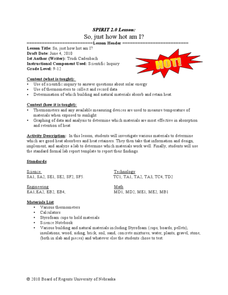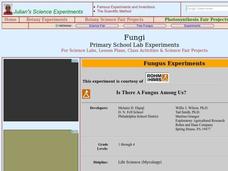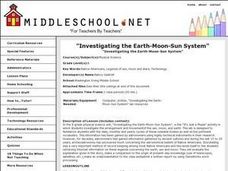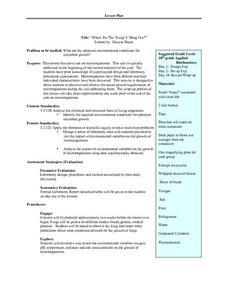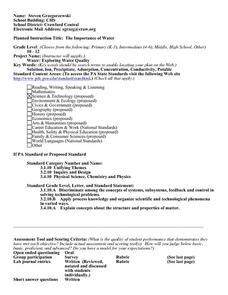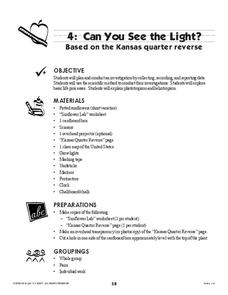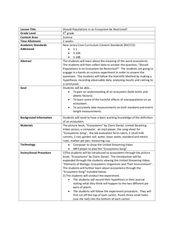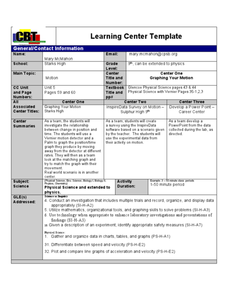Curated OER
Science Lab Skills
Young scholars develop problem solving, decision-making and inquiry skills by planning experiments. They conduct systematic observations, interpret and analyze data and draw conclusions then communicate their results.
Curated OER
So, just how hot am I?
Students design a lab demonstrating the scientific method. In this earth science activity, students investigate different materials for their heat absorbing property. They report their findings in class.
Curated OER
An Introduction to Thermal Spray Technology
Students discuss difference between kinetic and thermal energy, develop and demonstrate understanding of key concepts and characteristics underlying thermal spray techniques, list items used in their daily lives that are coated, examine...
Curated OER
The Seed Connection
Second graders investigate the best conditions for growing plants while considering how math, science, and technology are interrelated in this study. They partner with an upper grade through the use of the Internet and conduct a...
Curated OER
Antacid Lesson Plan
Eleventh graders use titration methods to study properties of antacids. They look at the strength, effectiveness, PH, and effect of supplements taken at the same time. They make observations after the different mixtures are combined and...
Curated OER
Fungi
Students examine the characteristics of fungi. In this biology lesson, students investigate the factors needed for fungi growth. They collect data and observations and write a report about them.
Curated OER
On the Microbe Trail: Bacteria and Aseptic Technique
Young scholars pour, label, streak, seal and store plates in an incubator. They identify areas in their environment that provide a rich fauna of microbes once they have been swabbed. They identify areas of contamination through a...
Curated OER
Investigating the Earth-Moon-Sun System
Eighth graders research Native American legends involving the sun, moon, and stars and compare them to the origin of present day knowledge. They create a written report and make an oral presentation of their findings to the class.
Curated OER
Flour Beetles
Students observe life stages in flour beetles and graph the results. They write a summary report.
Curated OER
"Where Do The 'Fungi's' Hang Out?"
Tenth graders engage in a lesson looking for the ideal conditions for microbial growth. The lesson is to be given once they have background knowledge about microbes. Students set up a lab in order to grow cultures over a period of two...
Curated OER
You are the Microbiologist
In this lesson, young scholars demonstrate comprehension of basic lab techniques by properly using these techniques in preparing a laboratory investigation, demonstrate synthesis of prior lab experiences by solving a new problem using...
Curated OER
Sea Ice Research
Students study sea ice and its importance in climate and climate change. They discuss sea ice as a presence of a food source for marine animals in the arctic and complete a lab activity. After completing the lab, they watch a video...
Curated OER
The Importance of Water
Young scholars explore the importance of water. They discuss why water is important and students design an experiment that evaluates the water quality and methods of improving water quality. Young scholars perform testing and report...
Curated OER
Biology: Howler Monkeys Tell All
Students examine a PBS special about howler monkeys as an introduction to scientific forensic investigative methods. In groups, they conduct a host of experiments containing clues which point to discovery. By challenging assumptions,...
Curated OER
Bioterrorism: Development of a "Superbug"
Students compare bacteria and viruses and their roles in biotechnology and bioterrorism. They outline fundamental steps of bacterial transformation and the possible selection processes to identify transformants. They discuss...
Curated OER
D Block Elements: Complex Ions and Oxidation States
Students investigate transition metals and their oxidation states. In this complex ion and oxidation states lesson plan, students use 6 transition metals and mix them with ligand solutions and oxidizing agents separately. They test their...
Curated OER
Language Arts: Plot Summary
Eighth graders implement plot summary organizers to identify essential elements such as conflict and resolution in literature. In pairs, they retell fairy tales to each other and complete plot summaries about them. As students read new...
Curated OER
Can You See the Light?
Explore plants and flowers with this lesson plan. Learners talk about plants, conduct an experiment with suflowers, and track a plants growth. This is a motivating way to present this concept.
Curated OER
Tie Dye
Students practice writing research proposals to test the color fastness of a dye once it has been exposed to a t-shirt. Each proposal needs details of experimental design, length of treatment, and means of cleaning the shirt. All...
Curated OER
Should Populations in an Ecosystem be Restricted?
Fourth graders experiment to determine how overpopulation effects ecosystems specifically plants. In this ecosystem instructional activity, 4th graders conduct an ecosystems experiment after listening to Claire Daniel's, Ecosystems. They...
Curated OER
The Artemia Hatchery
Students, in groups, develop their hatcheries, working cooperatively in its design and construction. The lessons begin with the introduction to Artemia as a primary food source of many aquaculture species during their larval stages.
Curated OER
Protect the Skin You're in
Students explore the importance of sun safety in relationship to skin cancer prevention. They test the effectiveness of various sunscreens and administer and analyze a simple survey to their peers. In addition, they implement a public...
Curated OER
"Graphing Your Motion"
Students study the concepts of motion, velocity, and acceleration through graphing their own movement using LoggerPro. They explain the difference between speed and velocity using the weather vane example. They discover the difference...
Curated OER
Introduction And Brief History of Materials Science
Students develop an understanding of the concept of matter. They l participate actively in the bubble raft experiment as described on the Center for Thermal Spray Research's website. They demonstrate dislocations and grain...

